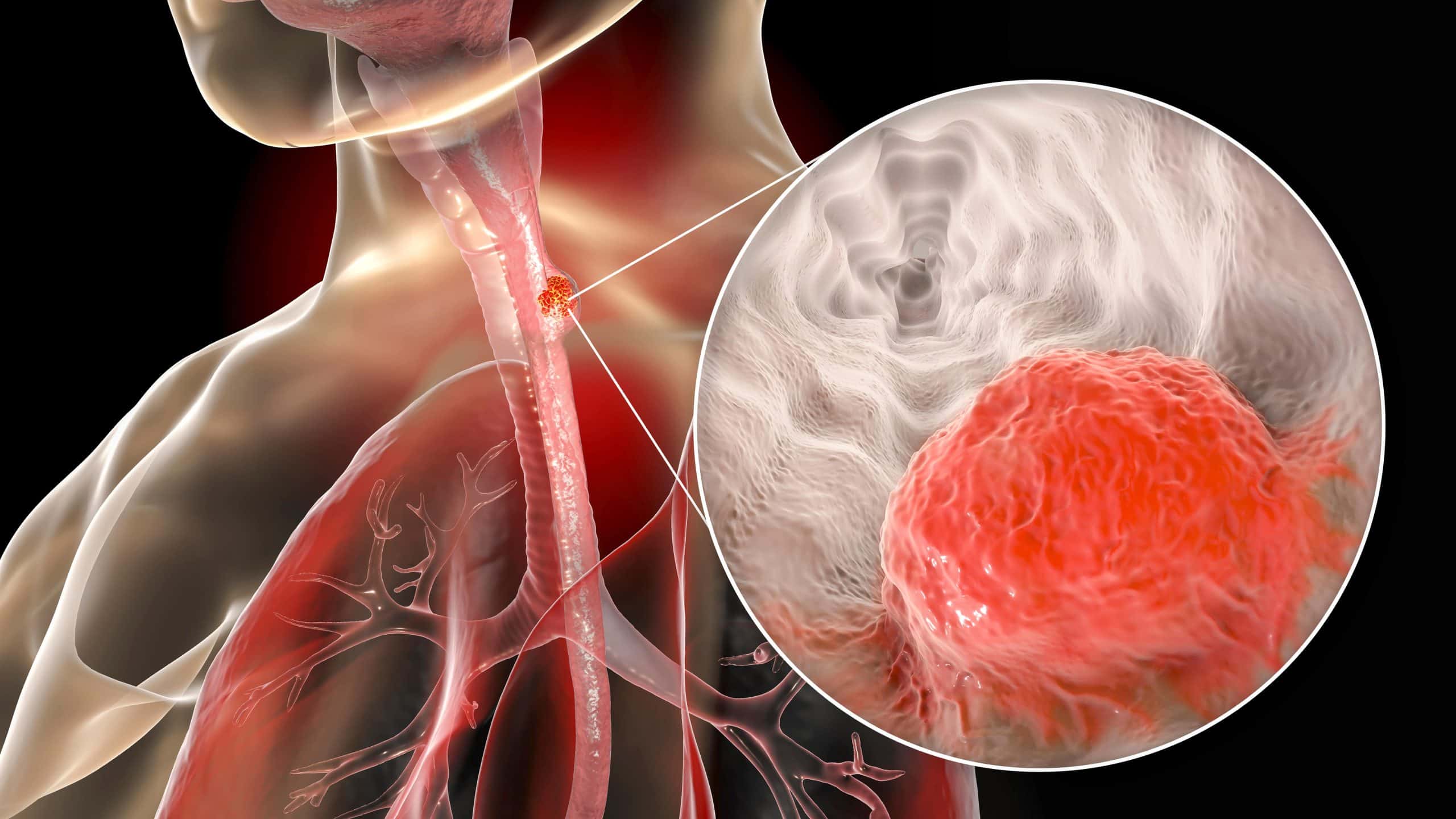
What is Oesophageal Cancer?
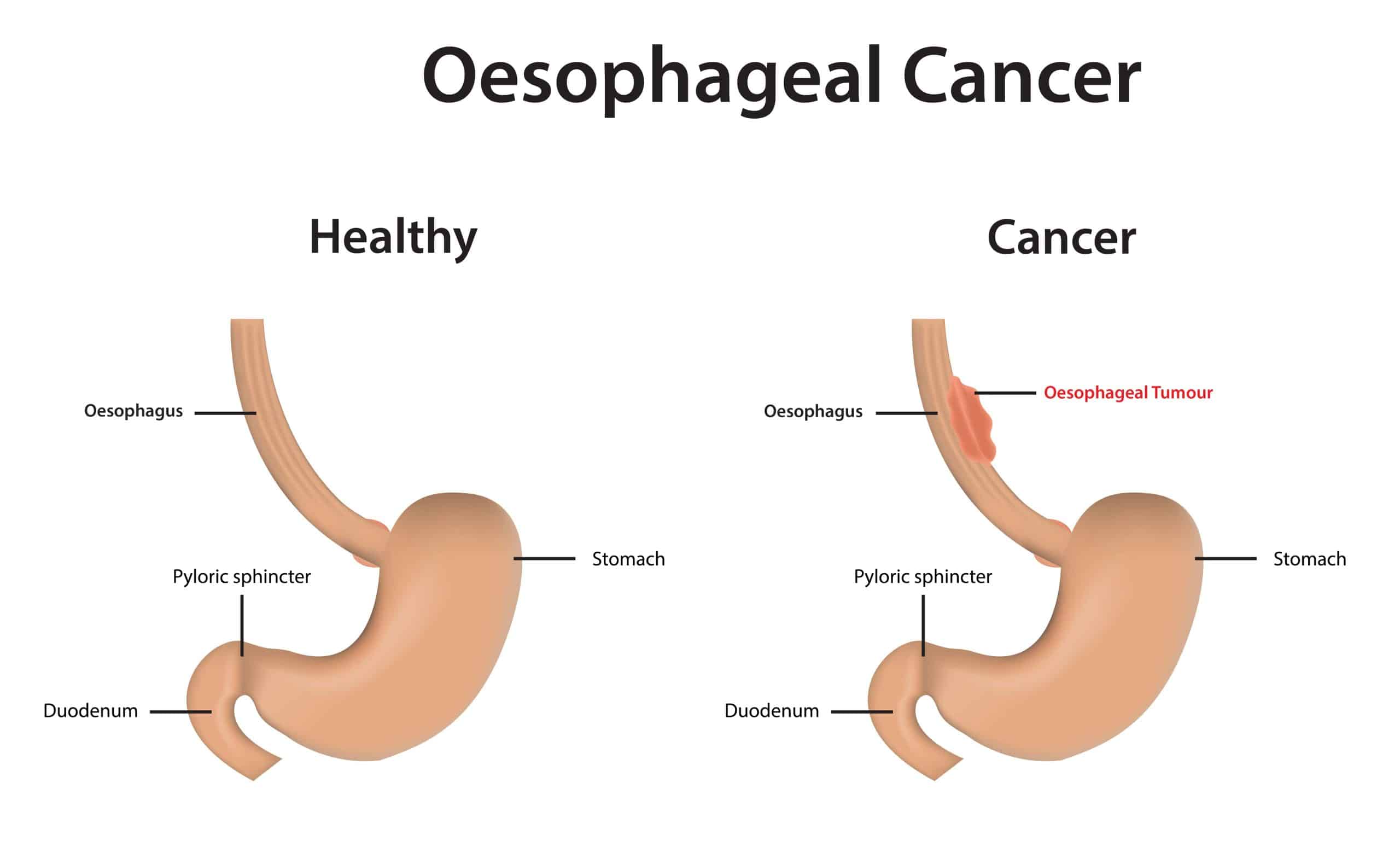
The oesophagus is a long, hollow tube that runs from the throat to the stomach. The oesophagus forms part of the upper gastrointestinal tract and helps to carry the food that we chew in our mouths, down to our stomachs for digestion.
The walls of the oesophagus consist of several tissue layers, including the mucous membrane, muscles, and connective tissue. Oesophageal cancer occurs when the cells lining the inside of the oesophagus undergo changes that turn them into cancer cells. The cells develop changes (mutations) in their DNA, which makes them grow and divide out of control. As these abnormal cells accumulate, they may form a tumour within the oesophagus, which can grow to invade nearby structures and, in advanced stages, spread to other parts of the body.
Most oesophageal cancer in Singapore tends to start at any part of the oesophagus. The two most common types forms of oesophageal cancer in Singapore are squamous cell carcinomas (epidermoid carcinoma), which affect the cells lining the oesophagus, and adenocarcinomas, which affect glandular cells in the oesophagus that produce and release fluids such as mucous. Other rare forms of oesophageal cancer include small cell carcinomas, sarcomas, lymphomas, melanomas, and choriocarcinomas.
Common complications of oesophageal cancer in Singapore include pain, bleeding, and obstruction of the oesophagus as the cancer advances, making swallowing difficult as it gets harder for food and liquids to pass down to the stomach.
Stages of Oesophageal Cancer
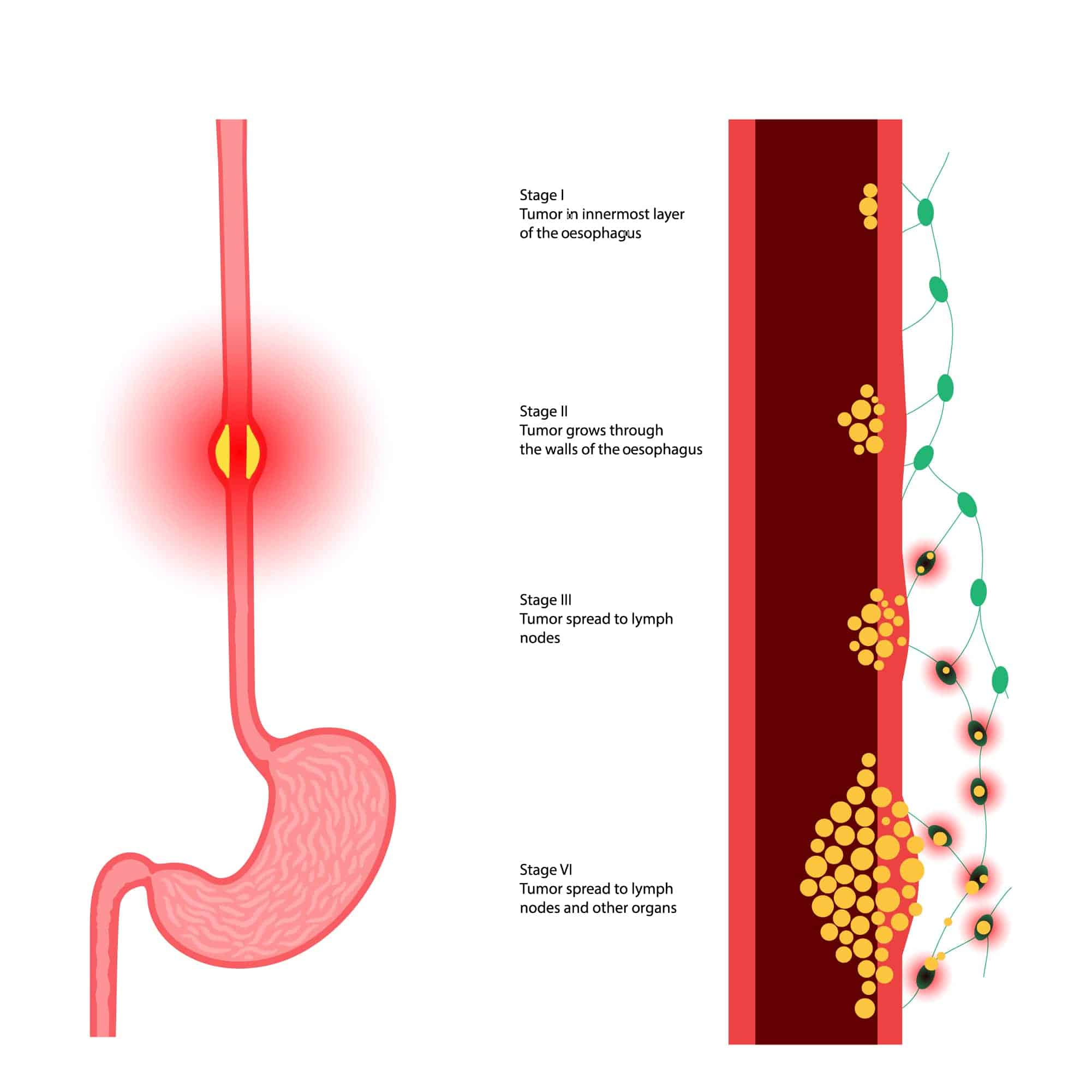
If you are diagnosed with oesophageal cancer, the medical team will then work to determine the current stage of cancer, which helps determine the most suitable treatment plan. In summary, the stages of oesophageal cancer are as follows:
- Stage I — cancer occurs in the superficial layers of cells lining the oesophagus
- Stage II — cancer has invaded and spread into deeper layers of the oesophagus, and may have also spread to nearby lymph nodes
- Stage III — cancer has spread into the deepest layers of the oesophagus, as well as nearby lymph nodes and tissues
- Stage IV — cancer has spread to other parts of the body
What are the common causes Oesophageal Cancer in Singapore?
While the cause of oesophageal cancer is not exactly clear, several risk factors predispose one to an increased risk of cancer. Risk factors include:
- Habitual smokers
- Heavy alcohol use
- Obesity
- Having a history of gastrointestinal reflux disease (GERD)
- Having a history of Barrett’s oesophagus, which is when there are precancerous changes seen in the cells in the lower part of the oesophagus
- Having a history of achalasia, which is when the smooth muscles fibres in the oesophagus fail to relax
- Having prior radiation therapy to the chest or abdomen
What are the common symptoms of Oesophageal Cancer in Singapore?
The symptoms of oesophageal cancer include:
- Pain or difficulty swallowing
- Hoarseness of voice
- Unexplained and unintentional weight loss
- Chest pain (pressure or burning)
- Indigestion, heartburn
Dr Benjamin Yip cautions, “if you have prolonged GERD symptoms or are diagnosed to have Barret's oesophagus, it is important to see a Gastroenterologist. He/she will be able to assess your risk for oesophagal cancer, which is often a very deadly cancer.”
Is it Oesophageal Cancer or GERD?
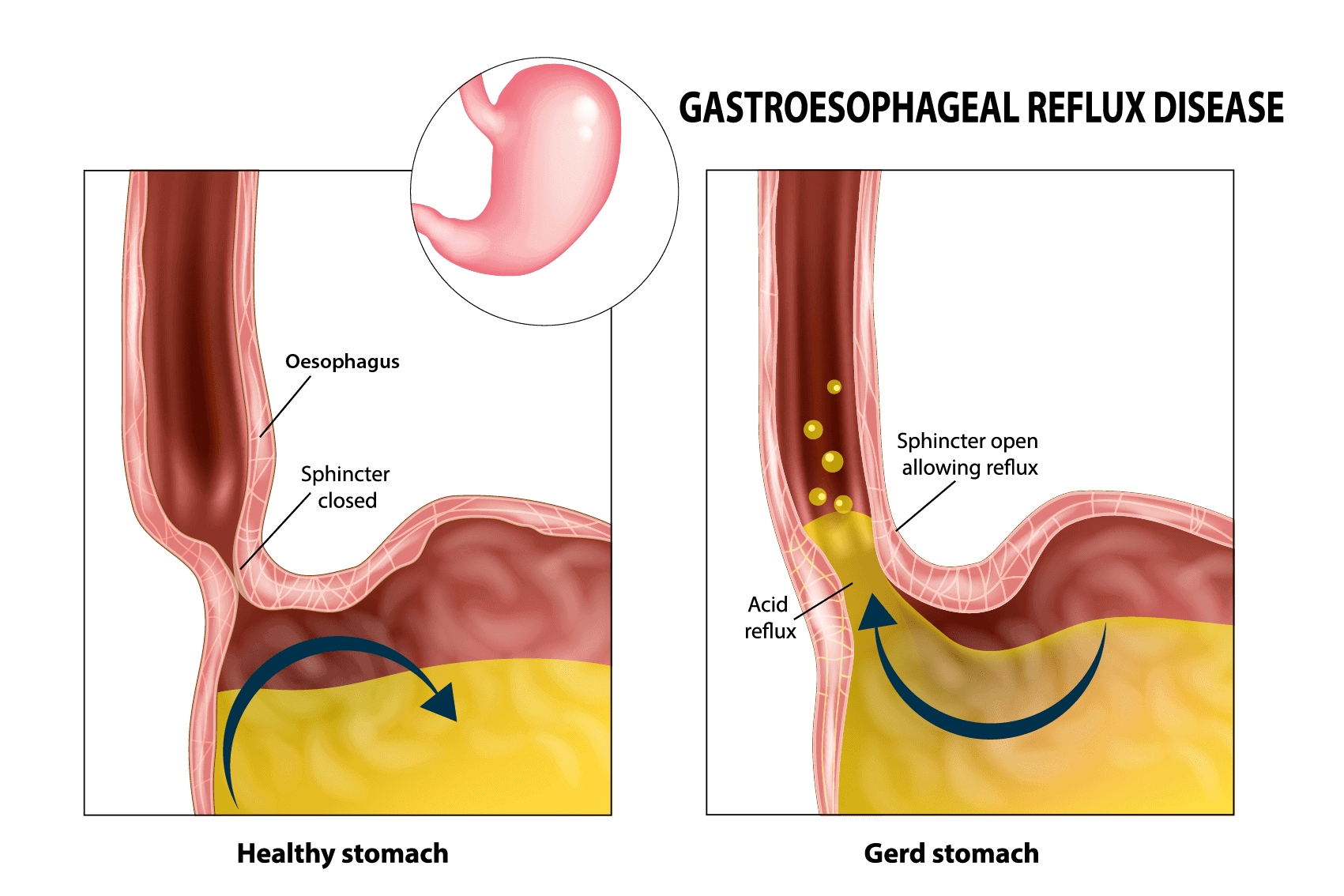
GERD develops when acid that digests food in the stomach refluxes upwards into the oesophagus. This may lead to symptoms such as mild chest discomfort, heartburn, regurgitation, sore throat, and cough, and it often occurs in those who overeat or lie down too soon after eating. Less rarely, it can also occur in those with anatomical defects in the valve that connects the lower oesophagus to the stomach (the gastroesophageal junction). When someone has GERD for many years, it can advance into a condition known as Barrett’s oesophagus (as mentioned above), which is when the cells in the lower oesophagus undergo precancerous changes in their architecture, which can eventually lead to oesophageal cancer.
However, even in those with GERD, oesophageal cancer is still considered a rare disease. Warning signs for cancer include weight loss that is sudden, unintentional, and significant over a short period (5%body weight or more), increasing pain or difficulty swallowing, loss of appetite, and hoarseness of voice. GERD symptoms, on the other hand, do not tend to have drastic changes over time and can typically be well managed by lifestyle changes and medications such as antacids.
How is Oesophageal Cancer diagnosed?
If you experience any of the symptoms mentioned above, your primary care doctor may refer you to a specialist after taking a concise medical history and conducting a physical examination.
These tests are used to diagnose oesophageal cancer:
Endoscopy
During this procedure, doctors will pass a flexible hollow tube (endoscope) that is equipped with a video lens down your throat and into your oesophagus. Through the video lens, the doctor will examine the inside of your oesophagus and help to pick out any changes in the lining of the oesophagus that might suggest cancer or any other signs of irritation and inflammation.
Biopsy, which involves collecting samples of oesophageal tissue for testing
Biopsies can also be done during an endoscopy procedure. As the endoscope is passed down through the throat into the oesophagus, the insides of the oesophagus are visualised through the scope, and the doctor will look out for any areas of suspicious tissue. If found, they might remove a piece of this tissue (biopsy) to be sent to a laboratory to look for cancer cells.
Barium swallow study
During this study, you swallow a liquid that contains barium and undergo a series of x-rays afterwards. Since barium can be picked up on x-ray, this can help doctors pick out any changes in the tissue of your oesophagus as the barium coats the inside linings of your oesophagus.
Endoscopic ultrasound (EUS)
An endoscopic Utrasound (EUS) is a procedure that combines endoscopy and ultrasound to obtain images of the oesophagus for imaging and staging.
Can Oesophageal Cancer be cured?
The prognosis and treatment of oesophageal cancer depend on a few factors, including:
- The stage of cancer when it was diagnosed
- Whether or not the tumour can be completely removed by surgery
- The general health of the patient
When found early, oesophageal cancer has a better chance of recovery. In its later stages, oesophageal cancer can be treated and managed, but rarely cured. However, extensive research into oesophageal cancer is currently underway, and many clinical trials are being done to improve treatment options. It is important to discuss with your care team treatment options and prognosis, as cure rates can differ among all patients, given the wide social diversity and medical background of every individual.
Is my Oesophageal Cancer serious?
The severity of oesophageal cancer is gauged by the stage of the tumour, with different stages carrying with it different risks and prognoses. Stage IV cancer is considered to be the most advanced, having spread to other parts of the body. It is important to attend formal testing by medical professionals to allow for accurate and safe diagnosis and staging to be obtained.
How is Oesophageal Cancer treated?
Several treatment options are available depending on the stage, type, and position of cancer. Three main types of treatment include surgery, radiation, and chemotherapy.
Surgery
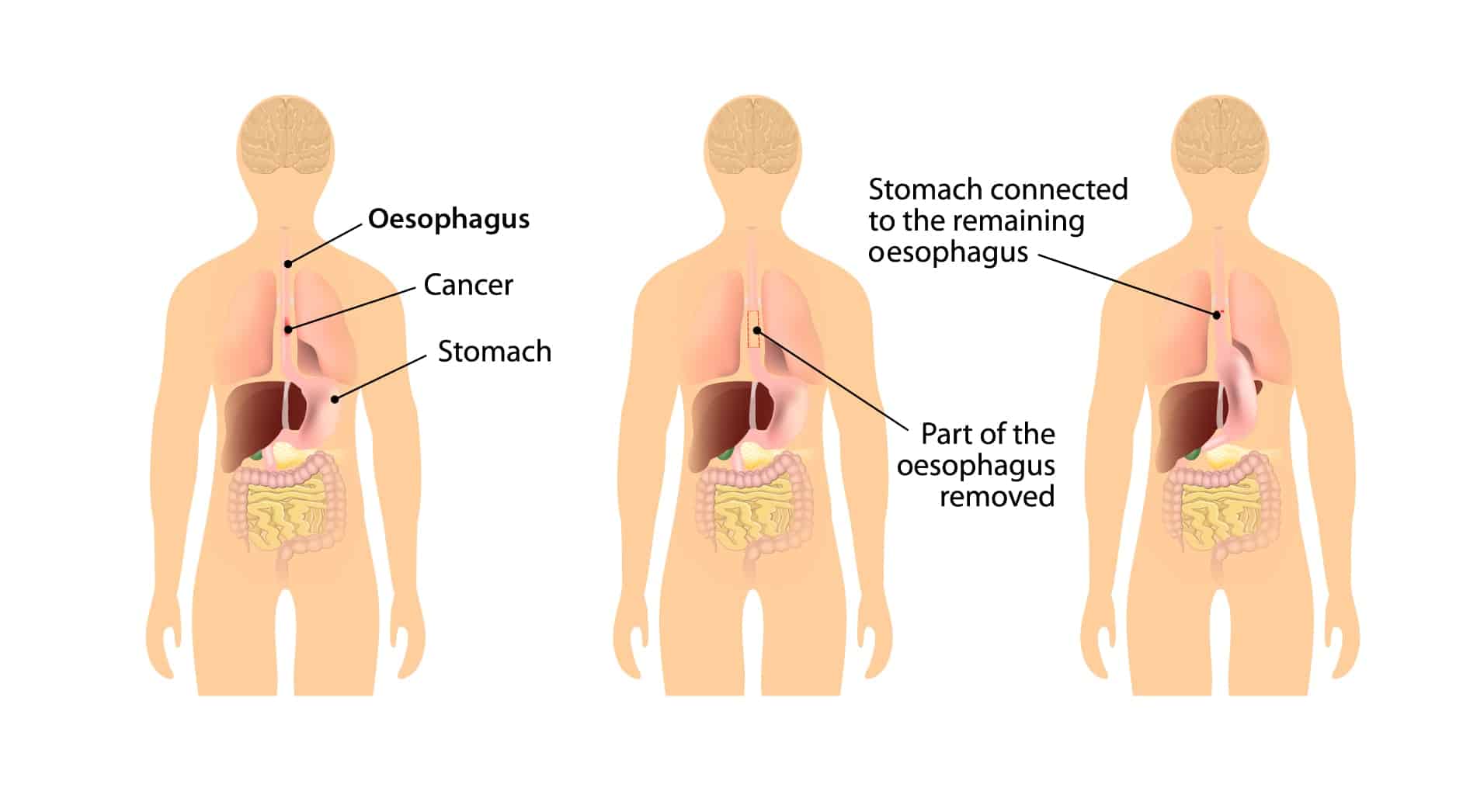
Surgery is the most common treatment modality for oesophageal cancer. Depending on the size and stage of the tumour, different surgical techniques might be employed.
In the early stages, with very superficial tumours, endoscopic resection is an option. It is minimally invasive, and endoscopic resection may be performed to remove the tumour and a small number of healthy tissues that surround the tumour.
In later stages, an esophagectomy may be performed. This means removing a portion of the oesophagus that contains the tumour, as well as nearby lymph nodes. The remaining parts of the oesophagus will then be reconnected to each other, and the stomach.
Radiation therapy
Radiation therapy uses energy beams to kill cancer cells. It can also be used to help relieve symptoms in advanced cancers, such as in the case of oesophageal obstruction from growing tumour size.
An area containing the cancer cells will be marked out by the medical team before treatment. During the session, either a machine that is outside the body will be used, with radiation beams aimed onto these target areas within the body to kill off cancer cells (external beam radiation), or implants will be placed inside the body near cancer to deliver radiation beams that kill the cancer cells (brachytherapy).
Radiotherapy is usually combined with chemotherapy to treat oesophageal cancer. It can be used before or after surgery.
Chemotherapy

Chemotherapy is a systemic treatment which involves the use of drugs to help kill cancer cells and shrink the tumour size. These drugs are either given intravenously or orally. Once the drugs are in the bloodstream, they spread throughout the body and target any cancer cells that are encountered.
Chemotherapy can be done alone or combined with radiotherapy before or after surgery. Typically, multiple sessions are required for oesophageal cancer.
Summary
Oesophageal cancer carries with it a high risk of morbidity and mortality. While there are no screening options available in primary care settings at the moment, it is important to understand the risk factors associated with oesophageal cancer and to examine whether or not you may be at risk of this disease. Lifestyle measures that can help in the prevention of oesophageal cancer include quitting smoking, consuming alcohol in moderation, maintaining a healthy weight, eating more fruits and vegetables, and avoiding chewing betel nuts.
References
- Berry, Mark F. “Esophageal cancer: staging system and guidelines for staging and treatment.” NCBI, https://www.ncbi.nlm.nih.gov/pmc/articles/PMC4037413/. Accessed 1 September 2022.
- “Esophageal cancer - Symptoms and causes.” Mayo Clinic, 19 April 2022, https://www.mayoclinic.org/diseases-conditions/esophageal-cancer/symptoms-causes/syc-20356084. Accessed 1 September 2022.
- “Oesophageal cancer.” Cancer Research UK, https://www.cancerresearchuk.org/about-cancer/oesophageal-cancer. Accessed 1 September 2022.

